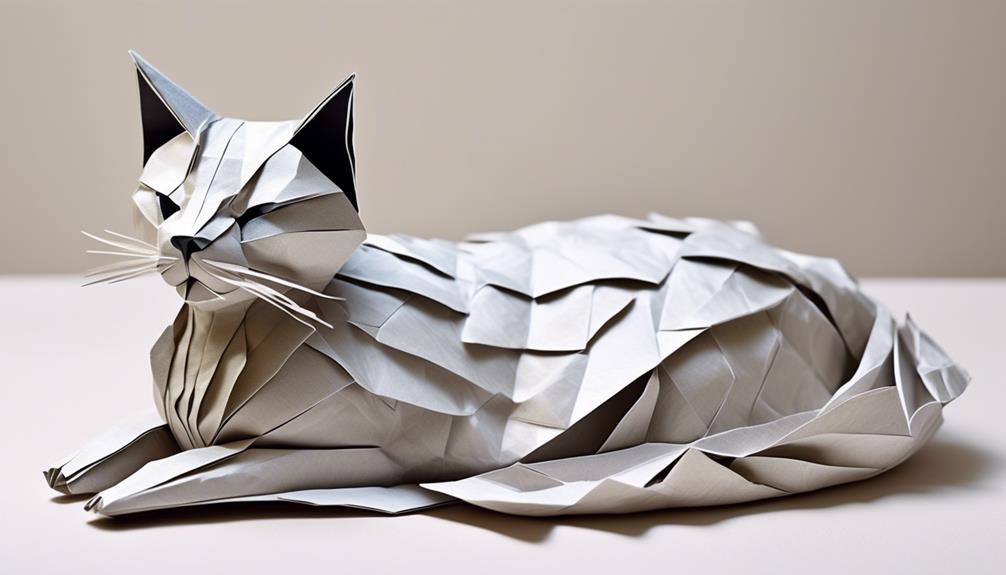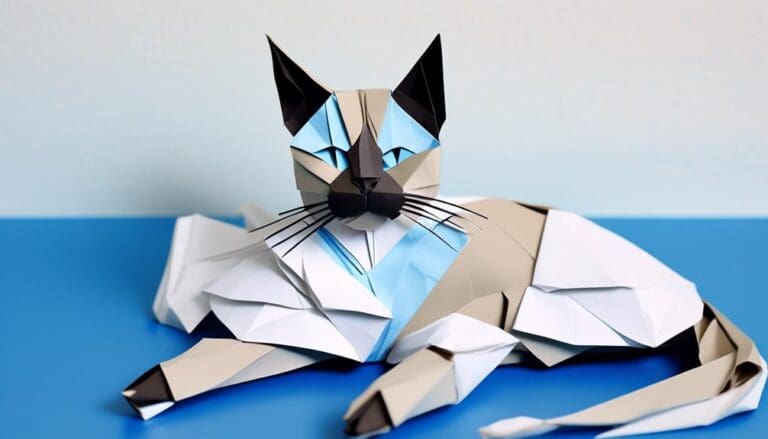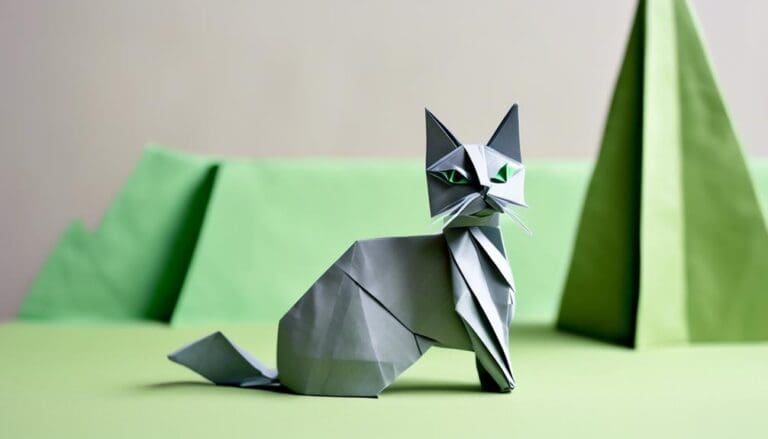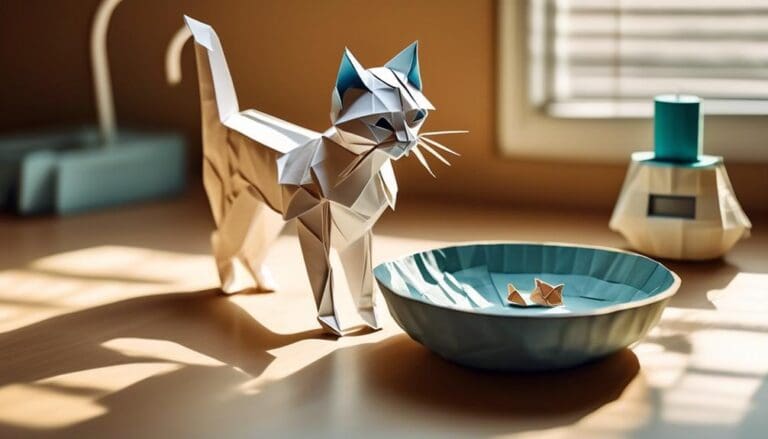As your cherished cat creeps into its golden years, you may notice a certain stiffness in its steps—a sign that joint health just can’t be ignored. You’re not alone in this; many pet parents face the challenge of managing arthritis in their senior kitties.
With a compassionate heart, let’s gently explore the world of feline joint care together, where simple strategies and suitable supplements can significantly soothe your cat’s discomfort. While there’s no magic cure, understanding the nuances of nutritional support, alongside veterinary advancements, can make a world of difference in your cat’s comfort and mobility.
Learn how to help your beloved pet regain the ability to jump easily again. We’ll show you how to turn those precious moments into reality.
Key Takeaways
- Senior cats may show signs of arthritis, such as reluctance to jump or climb stairs, sleeping more, and decrease in grooming.
- Veterinary examination and diagnostic imaging, such as radiographs, are important for diagnosing feline arthritis and assessing joint health.
- Nutritional supplements, like Glucosamine and Chondroitin, can support joint health and aid in repair.
- Prescription medications, alternative remedies like acupuncture and laser therapy, and weight management strategies can help manage arthritis symptoms and improve mobility in senior cats.
Recognizing feline Arthritis
If you’ve noticed your senior kitty isn’t as spry as they once were, they might be showing signs of arthritis, a condition that can significantly affect their quality of life. Recognizing feline arthritis early is crucial to managing their discomfort and maintaining their overall well-being.
Joint pain can manifest in various ways, such as a reluctance to jump or climb stairs, which might seem like your old cat is simply becoming less active due to age. However, these changes often indicate that your cat’s joints aren’t as lubricated and mobile as they used to be.
You might also observe them sleeping more, preferring to stay still, which could be due to the stiffness and overall discomfort associated with arthritis. A decrease in grooming is another sign, as reaching certain areas becomes painful. Conversely, excessive grooming of sore joints might occur, as your cat attempts to soothe their aches.
Pay attention if your kitty seems more aggressive when you touch their hips or joints, as this can be a reaction to the pain. If they’re spending more time alone or hiding, it might be their way of coping with the discomfort. Your love and attentive care are essential in helping them maintain healthy hips and a happy life.
Veterinary Diagnostic Techniques
You’re facing a challenging time, realizing that your senior cat might be struggling with arthritis.
It’s essential to work closely with your vet to identify the signs through imaging, such as radiographs, and to understand your cat’s joint health with comprehensive bloodwork.
These diagnostic techniques are crucial in shaping a comforting and effective treatment plan for your beloved cat.
Identifying feline Arthritis
When your senior kitty isn’t leaping as high or moving as gracefully as before, it may be a sign that arthritis is creeping in, and a thorough veterinary exam is the first step in confirming this condition. Understanding and supporting joint health in your cat is a cornerstone of senior kitty joint care.
Identifying feline Arthritis
- Veterinary Examination
- Assess mobility and check for swelling in cats’ joints
- Evaluate pain levels and discomfort
- Diagnostic Imaging
- Use radiographs to reveal cartilage deterioration
- Ongoing Monitoring
- Regular check-ups to manage joint purr-fection
Imaging Senior Cats
To ensure your senior cat’s comfort and well-being, veterinarians often turn to imaging techniques like radiographs to detect signs of arthritis not visible through physical examination alone. Your beloved cat deserves the best senior kitty joint care, and through these detailed images, vets can assess the health of your cat’s hips and joints. Treatment options become clearer, paving the way for interventions like liquid Joint Purr-Fection, a feline liquid joint supplement designed for joint lubrication and maintaining an active lifestyle.
As you seek to preserve your cat’s mobility, remember that these imaging sessions are a gateway to relief. They illuminate the path forward and allow for tailored care to manage your cat’s arthritis, ensuring their golden years are filled with comfort and joy.
Bloodwork for Joint Health
Building on the visual insights gained from imaging, veterinarians also turn to bloodwork as a critical tool in evaluating your senior cat’s joint health. This isn’t just about keeping them active in their golden years; it’s about ensuring the comfort and vitality that every aging pet deserves.
Blood tests reveal:
- Inflammation markers: Highlighting arthritis in aging joints
- Organ function: Essential for metabolism affecting joint health
- Infectious diseases: Such as FeLV and FIV, that undermine overall well-being
- Enzyme and protein levels: Offering a window into bone and connective tissues health
The Vet said understanding these results can illuminate the best path forward, including the benefits of certain liquid supplements and serving size recommendations for your cat’s specific needs. Your compassion is their comfort.
Nutritional Supplements for Joints
Caring for your senior kitty’s joints is crucial, and incorporating nutritional supplements into their diet can offer them the support they need for better mobility and comfort. These supplements are specially formulated with joint-loving ingredients like Glucosamine and Hyaluronic Acid, which are essential for maintaining healthy hips and overall joint function, particularly in cats with arthritis.
The PURR-fection Cat Glucosamine in a delicious organic beef gravy flavor is a hit among felines. It’s not just tasty but also packed with nutrients that are vital for your cat’s joint health. The LiquidHealth brand has crafted this formula to ensure that your cat gets the maximum benefit with each dose, promoting increased flexibility and mobility.
Here’s a quick guide to what these nutritional supplements can offer:
| Key Ingredient | Benefit for Your Cat |
|---|---|
| Glucosamine | Supports joint cartilage and aids in repair |
| Chondroitin | Enhances joint function and slows arthritis progression |
| Hyaluronic Acid | Lubricates joints for better movement |
| Opti-MSM | Improves joint flexibility and reduces pain |
| Organic Beef Gravy Flavor | Encourages cats to enjoy their supplement |
Prescription Medications
When your cherished senior cat begins to slow down due to joint pain, prescription medications can offer meaningful relief and restore their quality of life. Understanding that arthritis isn’t completely curable, these medications are designed to manage symptoms and help your cat maintain an active lifestyle and feel their best.
Prescription Medications to Consider:
- Non-steroidal Anti-inflammatory Drugs (NSAIDs)
- Specifically formulated for cats to reduce inflammation and pain
- Administer daily as prescribed by your vet
- Disease-Modifying Osteoarthritis Drugs (DMOADs)
- May help slow the progression of joint damage
Remember, while the Joint Purr Fection cat glucosamine hip and joint drop is suitable for some, prescription medications provide targeted relief. Hyaluronic Acid also provides improved joint lubrication, contributing to a smoother, more comfortable range of motion for your cat.
It’s vital to administer these medications strictly as directed by your veterinarian, as they’ll provide the essential nutrients to give your cat the best support possible. Regular check-ups are crucial to ensure the treatment plan is optimized for your cat’s unique needs.
With the right prescription medications, your senior kitty can enjoy their golden years with grace and happiness.
Physical Therapy Practices
You know how much your senior kitty means to you, and seeing them in discomfort can be heart-wrenching.
Embracing physical therapy practices, such as gentle stretching techniques and low-impact exercise routines, can significantly ease their arthritis symptoms.
Incorporating massage therapy can also offer your cat the tender relief they need to improve their quality of life.
Gentle Stretching Techniques
Integrating gentle stretching into your senior kitty’s routine can significantly enhance their joint flexibility and mobility, offering a soothing reprieve from the aches of arthritis.
Gentle Stretching Techniques
- Encouragement: Praise your old cat as they stretch to maintain an active lifestyle.
- Support: Use a cushion or support pole to help them feel secure while getting around.
Dedication to climbing and an active lifestyle keeps felines going strong. Encouragement and support can do the same for any cat. With a little help, they can enjoy their golden years with grace and comfort, continuing to explore their world with curiosity and joy.
Low-Impact Exercise Routines
To promote the joint health of your aging feline friend, it’s beneficial to incorporate gentle exercise regimens that boost their agility without overburdening their delicate joints. For cat parents, it’s critical to recognize that each elderly cat, grappling with conditions like arthritis, requires personalized care and attention. Picture your three-legged friend Whiskers, who remains inquisitive and lively despite their physical limitations.
Incorporate simple exercises such as soft paw raises and leg stretches that help preserve their flexibility. Even a cat like Whiskers, who navigates the world with one less limb, can still eagerly engage in playful descents, leading with their head.
These exercises are not merely about physical activity; they’re about nurturing the spirit and zest for life that your elderly cat continues to exhibit every day.
Massage Therapy Benefits
Massage therapy can be an effective method for managing arthritis in senior cats. It’s a gentle approach that has been beneficial for many, including cases involving three-legged cats who continue to thrive. This method not only helps in managing arthritis but also offers the calming effects of massage, which can be enjoyed by many cats.
Improves Joint Mobility
- Reduces stiffness, allowing for more ease when moving around
- Helps Peanut in climbing the trees even with his unique challenge
Enhances Overall Well-being
- Makes them more comfortable and happier.
- Can be a supportive supplement to help with getting old
Massage therapy isn’t just a treatment; it’s a heartfelt connection that can make your aging cat strong, and you’d never guess they’re battling arthritis. With each session, they can relax, rejuvenate, and keep moving around with the joy of their kitten days.
Alternative Remedies
Exploring alternative remedies can offer your senior kitty comfort and relief from the pains of osteoarthritis. Options range from acupuncture to nutritional supplements designed to support joint health. Acupuncture can help reduce inflammation and manage pain, while gentle laser therapy might also alleviate discomfort.
Embracing nutritional supplements, like fish oils, is a heartfelt way to serve your cat’s joint health. LiquidHealth’s 2.3 Oz Liquid Cat Glucosamine Joint Purr-Fection supplement is specifically formulated with ingredients known for their joint-supporting properties. These ingredients include GreenGrown™ Glucosamine, Chondroitin Sulfate USP, and Opti-MSM®. These key components can significantly contribute to maintaining your kitty’s mobility.
The liquid formula, with its organic beef flavor, isn’t only tasty but also suitable for cats. It’s designed to be given with ease. Just a dropper full mixed into their food or directly into their mouth. The beauty of a liquid is that it absorbs faster into their system, ensuring the benefits last longer. This offers your cherished cat a chance to feel more like their old self.
Weight Management Strategies
While alternative remedies like supplements can bolster your senior kitty’s joint health, managing their weight is just as crucial in reducing the strain on those tender joints. Weight management strategies are an integral part of senior kitty joint care, and they complement arthritis remedies beautifully.
Here’s a gentle guide to help your precious cat:
Monitor and Control Diet
- Follow the serving size recommendations from your vet.
- Consider specialized weight management cat food that supports weight control efforts.
Encourage Physical Activity
- Engage in regular play to keep them active.
- Remember, too much isn’t good—moderation is key.
Your dedication to their health shows in how much they’re scratching less and moving more. If you’re including supplements, remember that the product is best served with food or shortly after, as liquid absorbs faster. And if you’re wondering about those clever dropper formulas, a dropper formula has organic ingredients suited for sensitive felines.
Always consult with your vet to determine the recommended amount of food and exercise for your kitty’s specific needs. Together, with love and the right strategies, you’ll ensure their golden years are comfortable and joyful.
Comfort Enhancing Adjustments
To ensure your senior kitty’s comfort and ease their arthritis symptoms, consider making some simple yet effective adjustments to their living space.
- Provide a cozy blanket or warm cat bed where they can snuggle and find solace.
- Gentle massaging of your cat’s joints can offer immense relief when they’re relaxed, helping them to feel cherished and cared for.
- Assist with grooming those hard-to-reach areas to maintain their dignity and cleanliness.
Place their litter box in an easily accessible location to minimize the strain of getting in and out. If your home has multiple levels, consider keeping all of your cat’s essentials on the main floor to avoid the pain and difficulty stairs may cause.
In terms of nutrition, giving your cat healthy meals is important.
- Cats dry kibble can be harsh on tender joints, so wet food with a gravy flavor your cat adores might be more enticing and easier to consume.
- If you’re using supplements, a powdered supplement seems gentler; it often absorbs faster and benefits them more quickly.
- Remember to shake well before use if it’s a liquid, and it’s often best served with food, perhaps by dropping the product onto their favorite treats.
These thoughtful touches can create a nurturing atmosphere right under your front porch awning, where your kitty can enjoy the fresh air without the discomfort of roaming too far.
Regular Check-Up Importance
Regular vet check-ups are vital in catching the early signs of arthritis and ensuring your senior kitty gets the care they need to thrive in their golden years. Recognizing the importance of these visits can make a world of difference in your cat’s comfort and health.
Why Regular Vet Visits Matter:
- Early Detection: Just like a kitten at the age of two weeks needs careful monitoring, your senior cat requires the same attention to detect any changes in their joints.
- Treatment Adjustments: If you’ve started Mia on a new joint care regimen, follow-up appointments ensure the product onto our cats is working as intended. You’ll see if there’s a need to adjust the use for maximum benefit.
Frequently Asked Questions
What Is the Best Supplement for Cat Arthritis?
You’re on a quest for the holy grail of cat arthritis supplements, aren’t you? LiquidHealth’s feline glucosamine blend is your answer, offering gentle joint relief that’ll have your kitty leaping like a kitten again.
Do Older Cats Need Joint Supplements?
Yes, you’ll find that older cats often need joint supplements to maintain their mobility and ease discomfort from arthritis, enhancing their quality of life as they age gracefully by your side.
Does Glucosamine Help Cats With Arthritis?
Yes, glucosamine can help your cat with arthritis by supporting joint health and enhancing mobility. It’s a gentle, effective way to ease their discomfort and show your loving care.
What Are the Side Effects of Glucosamine Chondroitin for Cats?
You should watch for side effects like upset stomach, allergic reactions, or increased thirst when giving glucosamine chondroitin to your cat, and always consult your vet, if they’re on other medications.




